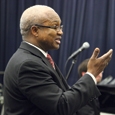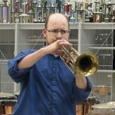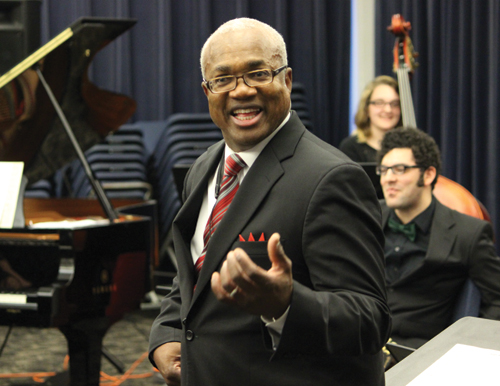
In Ron Carter’s office at Northern Illinois University, a mammoth poster of trumpeter Miles Davis hangs over his desk. The picture reminds Carter of his early years spent teaching at Davis’s old high school in East St. Louis and of the musical tradition he has devoted his career to spreading. Carter retired this spring after 20 years leading the legendary NIU jazz program. He is a member of DownBeat magazine’s Jazz Educators Hall of Fame and program director for the Jazz at Lincoln Center Band Director Academy. He has taught and performed around the world and is active as a clinician, performer, and author. We asked him to take a look back at the lessons from his distinguished and eclectic career and share his hopes for the future of jazz education.
Who first nurtured your passion as an educator?
My high school band director, Sam Berry, started me on trombone first, but I was so small I couldn’t get the position. I switched to bass clarinet and then Bb clarinet. My family was the only black family in the middle school. This was in the early 1960s in Georgia, so you can imagine what was going on. They actually closed all of the black high schools and bussed all of the black kids over to the larger white high school. Sam Berry took the job at Lowndes County High School for one year before becoming director of bands at Berthune-Cookman College in Daytona Beach. He instilled in us a strong work ethic and demonstrated great dedication to students. It made me want to do the same thing. I was an all-state clarinet player in my junior and senior year in high school, and I played in the youth orchestra in the local college, Valdosta State, at the time and studied clarinet with a professor named Robert Barr. At this time I wasn’t into jazz at all. I was a classical nerd. I told my mom that I wanted to go to school and major in music. Berry said that when I graduated, he wanted to give me a scholarship to come there, so that’s where I went.
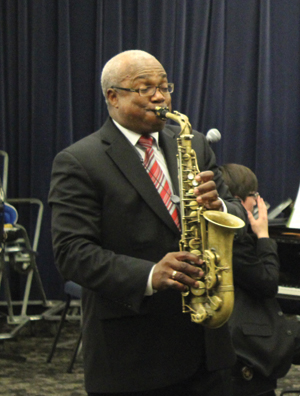 How did you get into jazz?
How did you get into jazz?
At that time, my parents asked me what I wanted for Christmas. I asked for a tape recorder and would sit down and imitate sounds and imitate all of the singers. That’s when I started transcribing, although I didn’t call it that. I started singing in this professional gospel choir when I was in the tenth grade. They were looking for somebody who could play saxophone and sing in this professional group near the Air Force base. I didn’t play saxophone so I borrowed my cousin’s saxophone, and I started playing in the group and singing.
These older guys in the group were in the military, and we played at all of the dances in the area. These guys would give me a 45 [record] and tell me things like, “Go copy this and write this out for the band.” So I just started doing it. There was no training for it. I would go write out (Sittin’ On) The Dock of the Bay or whatever it was, for the whole band.
I played some jazz in high school, but not at a high level. We were just playing corny rock tunes. I played bari sax, and there was only one guy in the band who could improvise, and he just did it by ear. In college I started playing in the jazz band under Sam Berry. I also started arranging because I was the copyist for the marching band. I learned to arrange through osmosis from copying so many marching parts.
Sam Berry graduated from Florida A&M University, and our school, Berthune-Cookman, became an offshoot of Florida A&M. This was a great experience because we learned so much about dedication and hard work. We would practice at 6 in the morning, go to breakfast, and then come back and have afternoon practice until eleven or twelve at night, just to get something right. That dedication was very important.
During the summer after my first year in college, I played with a professional group called The Morning After. We were opening for people like Buddy Miles and Gladys Knight. I wanted to drop out of school and be a professional musician but my mom said, “You’re going back to school.” I went back to school and continued my degree. I am glad I did.
Sam Berry went to University of Illinois in Champaign to get his master’s, and he talked me into going to grad school. I auditioned at a few schools, and I went to the University of Illinois, because that is where Sam Berry went. He died a few years later, at age 40. He was a great musical influence in my life.
What are of some of the major highlights that stand out for you as an educator?
I still remember taking my high school band to Europe for a week. I was working at the high school in East St. Louis. Most of these kids from East St. Louis had never been to downtown St. Louis. You can see the arch from the school, but they’d never been to downtown St. Louis. We went to the North Sea Jazz Festival, stayed in Amsterdam, and traveled to Belgium. I actually took the band to Europe twice. It was a great experience.
Did you agonize over what pieces to perform at your last concert at Northern Illinois?
Not really. I have always picked tunes that fit well with the band I’m conducting. Nothing has changed, so I haven’t agonized. All the agonizing has been about trying to bring in a guest artist. When I first started here I would bring in older guest artists. This year I brought in all of the guys that I’ve known and worked with over the years. So we brought in Rodney Whitaker, who I’ve mentored for many years. He leads the Michigan State jazz program. I also brought in Donald Harrison, a good friend of mine. Vincent Gardnes is our tour guest for my final tour at NIU.
What qualities do you look for in a guest artist?
In addition to how well they play, how well a guest artist can interact with the group is important. I also look at how comfortable they are working with young people. When we go out on tour, it’s not just a tour, but we give clinics and workshops in addition to the concerts. The guest artist has to work with all of the bands and students through masterclasses, clinics with all the students, sectionals, and rehearsals.
When we go out on tour, I’m teaching my students how to teach. I think that’s why we have had such tremendous success at Northern Illinois at placing students into teaching positions, both at public schools and at universities around the country. Going on tour allows students to make connections before they graduate, but it also shows them how to teach, how to get along with directors, and also how to work with students of all different ages.
In looking at people who come in here during job searches, I find many people who can play, but the teaching part is just not there, because they have never had an opportunity to do it. They have read about it, but they haven’t actually had a chance to do it. Very few players can make a living just out of performing. Even Wynton Marsalis gives clinics, and he makes a pretty good penny.
When I started at NIU, I told one of the professors here that I was going to gear toward pedagogy and performance. I learned this from Clark Terry, who I did a clinic with in 1977. He said, “You have to be able to teach and you have to be able to play.” My thing has been to tell students, “Never stop playing,” but also “Never stop working on what you teach and how you teach.” That is one reason I write books and still give clinics. When I was asked to join the Jazz at Lincoln Center Essentially Ellington Program with Wynton Marsalis eighteen years ago, I told him that if it was just about a competition or festival, I did not want to be involved. If it is about education, then I would be interested. He and I are the only two who are still involved from back then. It has been effective. That program has put more great music in kids’ hands than any other program out there.
If you’re working with an orchestra, it is almost a travesty if the students are not playing music like Beethoven’s Fifth. It’s wrong if a concert band is not playing the Holst Suites or Lincolnshire Posy. With jazz bands, too often all they are playing is just sub-grade music.
I was doing a clinic at a high school in St. Louis recently, Lindbergh High School. The director said to me, “What I’ve decided is that I want to have a jazz band – not a band that just plays big band charts,” which means that he wants to play real literature and have his students learn to improvise.
One thing that I have emphasized is this: if you truly understand the essence of this music, then you can make a living because all popular music is based on the same tradition that jazz came out of. You have to know the concepts and where they came from. If you’re just reading notes, then you’ll never know or understand the relationship between the music and dance, between the music and the different things that make popular music work.
I guess that’s one reason why I’ve got the head of the Glenn Miller Band as a former student from here, the drummer for Kanye West, Dianne Reeves’s drummer, and Wynton Marsalis’s pianist, Dan Nimmer. These players cover so many different things, and students who can play in all different styles can build a career in music. I think that’s why this program has been so successful, because students can come here and get an opportunity to play in the orchestra, the jazz orchestra, the marching band, whatever. You can cover all the bases, and there are no barriers to playing in the Latin group or the jazz group. You’re actually encouraged to do them all. So I think that makes our students versatile.
I do wish that music education students here were able to encounter more of the jazz curriculum. I think a lot of times it is assumed students know about jazz because they went to NIU, but a great percentage of them do not. They might participate in the band for one semester, but they never would take the jazz band class. I’ve opened up the intro to jazz studies class and the jazz pedagogy course to any music major.
Has there been a guest artist or two who stood out to you as being particularly special?
Jimmy Heath is just fabulous, with the stories he can tell, and he’s just such a great composer and arranger. He’s 86 now, but he can relate to young kids, walking around with his cell phone and texting. Working with people like that inspires me. Ed Thigpen and Benny Golson also stand out as great folks we have worked with as guest artists.
What are some ways in which you have seen jazz or music education change since you started working in East St. Louis through your time at Northern Illinois?
The biggest change is that because of technology, students don’t really communicate with each other anymore, so they don’t know how to listen. I teach all over the world, and students in other countries listen to the music and study it. Students in this country learn a solo or they learn some scales, but do not commit to learning the jazz language. I think that’s the biggest breakdown that’s happened now.
Students have the illusion that you can learn a scale, core relationship, and improvise, and think that was the foundation of improvisation, not realizing that it is a language that you have to study. I taught at Lincoln High School for all those years, where Miles Davis went to school. I talked to Miles Davis about whom he listened to, and I also talked with Dizzy, when Dizzy played with my high school band, about what you should listen for. There’s no such thing as stealing in jazz; you learn the language and you use it.
There are still many jazz bands that play great traditional jazz and teach students that musical foundation. We don’t speak negatively about traditional wind literature or traditional orchestra literature. I realize the importance of making that foundation. It is essential to study and perform that music. I tell students all the time to study Duke Ellington, who is the foundation for everything. The foundation for every voice spoken out there came through that Duke Ellington band or the Count Basie band in some kind of way. If you study those two bands, then everything else falls somewhere within there. A student might say he likes Michael Brecker or Stan Getz, and I will ask “Okay, who’s he coming from?” Whoever you like, go back and find out who they studied, and go study those people as well. Then put your own spin on it – put that in your language and personality and develop your own voice. That’s the point you’re trying to reach. Benny Golson taught me something that stuck with me for many years. He said, “When you hear something and you really like it, it’s already a part of you. Your job is to connect with it.” If students don’t listen, they never connect with it.
There are many factors involved in teaching students how to listen and learn the jazz language. I am giving a workshop at Midwest on this. Students are listening, but then they don’t know what to listen to and they are not committed to listening the same way we were committed to listening to learn language.
I give students names of jazz artists with the instruction to put these players’ names in their cell phones, because they are not going to lose that. I give them very few names for people to listen to now. I say, “Just go listen to Lester Young and listen to Ben Webster” for tenor saxophone. Some directors give out these long lists, but it is wasted ink. Students are not going to go through these long lists. It’s like saying, if you want to learn English, I’m going to give a thousand different folks to listen to from across the country who speak English differently. Atten-tion spans are extremely short now, and that makes this very difficult.
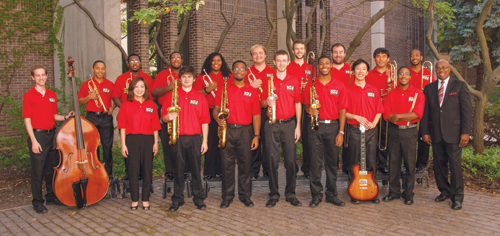
If I was to start teaching at a school without a jazz band, what would you tell me are the benefits my students could gain from jazz that they would not learn from concert band or marching band?
They will learn how to use the human voice. Once you start singing phrases, you start listening to how you fit, balance, blend, and intonation – all of the things that most directors address. I am constantly working with my college group by singing phrases. If they get used to hearing when the focus is pitch, and they are singing and reproducing it, then it helps with their instrument. On all the instruments, you’ve got to be able to hear. It’s not just pressing the right valve, putting the right slide position out, you have to be able to hear.
Also, jazz is an essential part of this country’s history. You can study classical literature, but it is really music from a foreign land. Jazz is the only music that was actually molded in the United States. Everyone else in the world realizes that and respects American jazz musicians at a high level, but in this country everything is taken for granted.
Of course, I am classically trained, so I’ve studied Brahms, Mozart, and Webern, but I couldn’t really study who I am through that music or what happened in this country through that music. I just loved the music and still do. I learn so much from understanding what Duke Ellington went through – how he had to buy his own passage car because he couldn’t ride in the other cars. In all these different Ellington songs you hear train effects or how he voiced a chord sounded like a train horn blowing or steam coming from a steam engine. Those insights are very influential.
Why do you think it is that if you go to a jazz performance, there are very few African-Americans in the audience?
I was just in Iowa City and worked with four high school jazz bands, a combo, and the middle schools. There were maybe three African-American students in the middle school bands, and maybe two in the high school bands. If you cannot afford an instrument in fifth grade, you never get a chance to play jazz – or any other school ensemble – later. In too many places economics is the determining factor for who plays music. There are also so many economically deprived areas that are not necessarily all black.
When I arrived at NIU, I asked, “Where are all the minority kids in the program?” There is a significant African-American and Latino population in Rockford and Chicago, but these students were not represented in the college music program. You have to make a conscious effort to grant access regardless of economics or when you started.
The first thing I did was start the Rockford Youth Jazz Orchestra, and I started the youth jazz ensemble in Chicago to get minority students involved. The Rockford program generated a few students, but in Chicago the jazz ensemble generated tons of students, where many came through NIU and graduated. When I got here, there were very few minority kids who even graduated from the program.
A lot of times students have come here and graduated, and some of the most outstanding students probably would not have even qualified to get into a lot of other schools because they had never taken private lessons or been given the opportunity. I hope that will still happen here after I am gone.
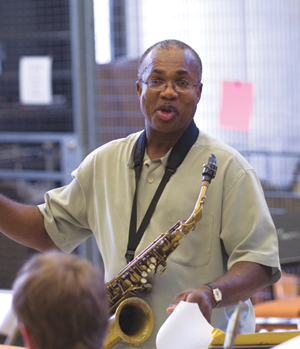 What are your hopes for the future of jazz education?
What are your hopes for the future of jazz education?
I really want to see jazz education as a truly integral part of the education of our music educators going out there. I work all over the country and see a lot of directors. I think that if you have a music education degree, you should be able to teach all kinds of music at some level. You will not be an expert at all of it, but I think you should at least know enough to get started. That is one of the reasons that we started the Band Director Academy at Jazz at Lincoln Center. For the past sixteen years, it has helped many directors fill that gap in their training. I hope whoever follows me at Northern Illinois shares the same inclusive kind of attitude that I have. Anybody who wants to learn music should be given an opportunity.
What is the best advice you can offer to fellow educators?
Never stop learning. I was telling a young man recently that during my first ten years of teaching, I went to school every summer to take jazz arranging, brass methods, and rhythm section methods because those were areas in which I needed more expertise. I didn’t run from what I didn’t know. After a while, my rhythm section was always the best rhythm section. I learned how to play trumpet all over again, so if a student had a problem, I knew how to help. I truly believe that the only thing that can hold a student back is the teacher, because students will learn anything if you give them the opportunity and have patience to give them enough time.
